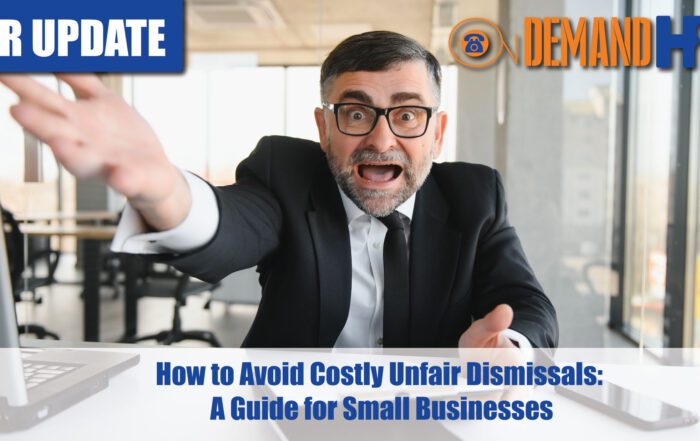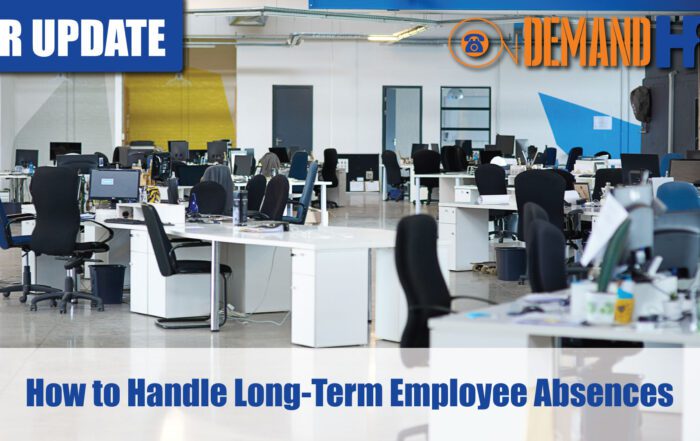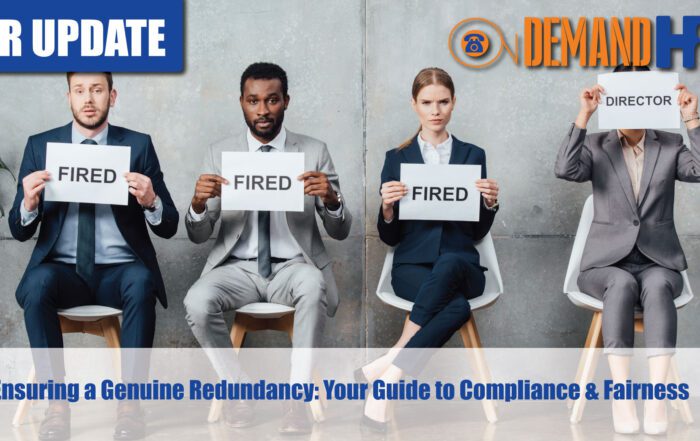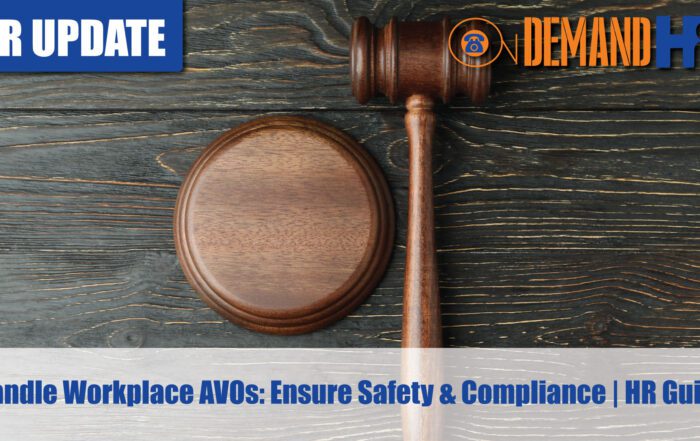The Unfair Dismissal Process
Has your business ever had to face an unfair dismissal application? We share the process your business will need to go through to defend an unfair dismisssal claim as well as some tips and strategies we use to achieve good business outcomes without incurring excessive representation costs.
Please see below for a full transcript of the video
o
Share the HR or workplace relations challenge facing your business and one of our experienced consultants will be in touch within 24 hours with a strategic action plan or discover the best strategy yourself by accessing out free online training library.
Transcript
0:11
Good morning, everyone. Welcome to another edition of HR Fridays. My name is Clint Indrele Managing Director of On Demand HR. Today, we are going to cover unfair dismissal. And we’re going to talk through the process of an unfair dismissal claim and how you would deal with that in the Fair Work Commission. Every Friday at 10am. We’re going to present on a different HR and IR topic, so please let us know any future topics of interests. If you’re watching live, please feel free to ask any questions. The whole purpose of HR Fridays is trying to provide businesses, our professional advisors and other associate members, which is advice, which is reality, trying to stop the noise and the scare tactics of other consultants you might hear out there in the marketplace. We’ve been in the field commission many times, we’ve done many workplace investigations. And we’ve dealt with the Fair Work Ombudsman many times. And we provide real perspective on these issues, not just theory, so www.ondemandhr.com.au.
So let’s get stuck into unfair dismissal today. So I guess, let’s just sort of start with some basic principles of how an unfair dismissal application would come about. So first of all, the employee must submit what is known as a form f2 application for unfair dismissal. So they must do this, within 21 days of them being dismissed from their employment, the application costs currently is around $74.50. So it’s a very, very low barrier to entry. In terms of making that claim in the commission, it must the employee must be less earns less than $153,600, as of the first of July 2020, there are some some exceptions to that rule. But generally speaking, you must be under that amount to make an application,
The system is designed so that people can be self represented in the in the process. So that is something to be aware of. It’s a no cost jurisdiction in the Fair Work Commission. So that means that a win Lose or Draw, typically, you will not have your costs covered by the other party. So that’s very important to understand when you’re going into these claims. Because even as an employer, if you think that you may be in the right on a various various things, there’s still going to be costs associated with you having to go to hearing to prove that you are right, in fact, so that is a consideration that always must be front of mind.
As far as the early steps for the employer. So the employer typically when the application is filed with the commission, typically the employer will then receive it a few days after, it’ll be sent by the Commission to the employer, for them to provide a employers response to so that is the form f3 employers response. And typically, the obligation is to provide that within seven days. Normally, the Federal commission would then schedule a teleconference for conciliation within two to three weeks is what we find most of the time, sometimes a little bit more, sometimes a little bit less. So that’s what you can expect as far as the Commission’s early processes are concerned.
So we then go on to I guess, the telephone, conciliation and what is involved with that? So first of all, the Fair Work Commission will organize a specialized conciliator to the matter, to conduct the conciliation so that the first thing to understand is that you won’t necessarily have a commission member facilitating conciliation. In fact, that’s quite rare, you’ll more likely have what they call a staff, a staff conciliator. So that is someone who’s a specialized conciliator, who’s used to who’s got a very good understanding of of the law and understanding of you know, the key principles around unfair dismissal and so on.
In a conciliation conference, it normally runs something like this. So each side will have an opportunity to present their case uninterrupted for about 10 to 15 minutes and bear in mind the conciliator doesn’t make any decisions, they purely listen to both sides of the argument for the purposes of negotiation. So the applicants are the individual is made the applicant application goes first, and then the respondent the employer goes second. So that can either be done directly by the applicant or by their representative. And the same with the respondent. It can be done by their representative as well.
On Demand HR, we’ve been a paid agent over 150 times in unfair dismissal matters since 2010. Paid agents and advocates are very, very common in these particular matters. Lawyers also play in unfair dismissals, but it’s important to note that in these situations, it can be a very good idea to use a consultant or an agent such as us to run one of these matters, particularly when those people are specialized in those types of services.
Yes, so that’s that’s ultimately what happens at the start of the conciliation. The conciliator may make some early comments about the submissions made by the parties at the start of the conciliation, the parties may then enter into some negotiations to resolve the matter. And the conciliator may break off into what we call private conferences. So they may break off and speak to the applicant first, maybe understand what sort of money or outcome they’re wanting to resolve the matter. They may then speak to the respondent or the employer to see Well, what are they prepared to do to resolve the matter? Are they prepared to put anything monetary on the table and then most of the time, it’s a monetary settlement that resolves these things. There are sometimes other situations that may come into play, such as, look, sometimes there might be no monetary offer, but simply a, you know, a reference or a statement of service or something like that. Sometimes there might be an agreement to reinstate a person into that position that is extremely rare, but it can happen. In terms of hearings, reinstatement happens around about 3% of cases. So it’s pretty rare that reinstatement is awarded, typically, and more likely when unions are involved on the applicant side.
In terms of the negotiations. So the conciliator, as I said, doesn’t make a ruling, they purely put strengths and weaknesses to each side as to what they can expect in the process going forward. And yeah, obviously, if they don’t resolve at conciliation, or then the matter goes to a hearing at the Fair Work Commission.
So following the conciliation, you would then get directions for evidence. So typically, what happens in those directions is that the applicant would be given a couple of weeks or two to three weeks to file their evidence and submissions. So submissions is sort of an outline of your case, formal outline of the case, bear in mind that what you’re saying conciliation is not necessarily binding that is on a without prejudice basis. So you can sort of say things in conciliation that you don’t necessarily need that don’t necessarily need to be solid or proven. But when you start getting into submission stage, you need to say things which are much more solid in your case. Otherwise, those submissions obviously can be criticized during the unfair dismissal hearing process. So you would file submissions, and evidence when I mena evidence, you talking statements and attachments to those statements typically, is what you would see.
So typically two to three weeks for the applicant, then two to three weeks for the respondent to respond to those things. And then the applicant typically gets another two to three weeks after that to provide anything final that they wish to put forward, then we’re off to a hearing.
So maybe after, let’s say 3,6,9 weeks, plus a bit of extra time, maybe after 12 weeks, we’re off to a hearing at the Fair Work Commission. And then essentially, that’s when we kind of have a courtroom style hearing. If you like more informal than a courtroom, there is two types of, I guess you could say, formal decision processes. It’s either a hearing or a conference, a hearing is more common. A conference is kind of less formal, where the parties might seek to do a conference when one or both of the parties isn’t represented. But typically both parties represented you’re off to a hearing.
In a hearing. Basically, again, businesses can appoint an advocate like us who’s not required to be a lawyer. We’ve run many cases all the way to hearing you’ll see my name in case law, from various different matters we’ve run in the past. And ultimately there is an opportunity during the formal process even to reach an agreed outcome. The conciliator may very well, should I say the commissioner who runs the hearing may roll up his sleeves and say, Look, I still think we can resolve this, there might be discussion prior to the formal hearing on the day about still solving the matter. And that can result in a resolution.
In terms of if that doesn’t happen, well, then what will happen is that the applicant will typically put forward witnesses, the respondent will put forward witnesses, those witnesses will provide evidence, they’ll be cross examined on their statements, and then it’ll be re examined by their by their representatives about the evidence they have given. The commissioner, you might hear this over one day, two days or three days, depending on how many witnesses are involved, how complex the matter might be. And then after all of the evidence is heard or submissions are provided, the commissioner will then make a decision.
But that decision typically won’t come out for another. You know, it could be four to five weeks or six weeks after the actual hearing has taken place. So you won’t get a decision on the day, like you might see in law and order and TV shows like that, but you will get a decision in the coming week.
So I think some final considerations on unfair dismissal are as follows. So the commission can award up to 26 weeks compensation if it determines that an unfair dismissal or dismissal is unfair. Section 396 of the Act talks about the factors that the Commission considers when awarding compensation if it finds a dismissal to be unfair, so just just to be clear as well, an unfair dismissal is a dismissal that is harsh, unjust or unreasonable. Those concepts are obviously very loosely defined in very many different cases over the years that have defined these things or provide a clarity around these things in certain cases.
So section 392 talks about how compensation is considered. It factors in things like has the employee found other work since being dismissed? Have they been paid any other money since been dismissed, and those factors can be discounted against what the compensatory award might be.
In terms of Section 387 of the Act. That’s another very important part of the Act that talks about the criteria for how the commission will consider an unfair dismissal what it considers when determining whether a dismissal is harsh, unjust or unreasonable. So that’s a really good section to be across as well. Again, at all stages during the process, parties can negotiate. Again, there’s a great opportunity to appoint an agent, such as us, particularly when we do the lead up into the termination. If we’ve given you advice around having a good procedurally robust, unfair dismissal process, or shall I say dismissal process, then you should be in a great position to defend an unfair dismissal later on, or there should be at the very least a position of manageable risk. So that’s important to note.
Unfair dismissal is a highly specialized area. There’s a number of generalists lawyers that don’t have the experience in this area. So that’s important to note as well. But just because you’ve appointed a lawyer doesn’t mean that necessarily that person is going to be great, very effective at these particular types of matters. We see a lot of, I guess, you could say, generalist practitioners, but we count against in the Fair Work Commission. And I would say that we have a an advantage in dealing with those matters. Others might laugh at that, and scoff at that. But that is, in my observation, the the reality of the situation, we deal with so many of these that we’ve become very specialized in this area. But some of the Employment Lawyers, obviously very, very good and very difficult to opponents at times. But yeah, certainly one part of our service that’s a little bit unique is that we can give advice leading up to the termination to set it up for the response afterwards. And there’s a great nice continuity there of advice given prior and advice given after and representation after.
So that’s, that’s pretty much unfair dismissal, in a nutshell, the process, what to think about and how you might consider some of these matters. So really appreciate your time once again on HR Fridays, I hope you’ve got something out of today’s session. If you’ve got an unfair dismissal matter that you have or dismissal that you are considering, please get in touch with us at On Demand HR www.ondemandhr.com.au Once again it’s Clint Indrele, managing director On Demand HR have a fantastic weekend and we look forward to talking to you again soon. Bye for now.






